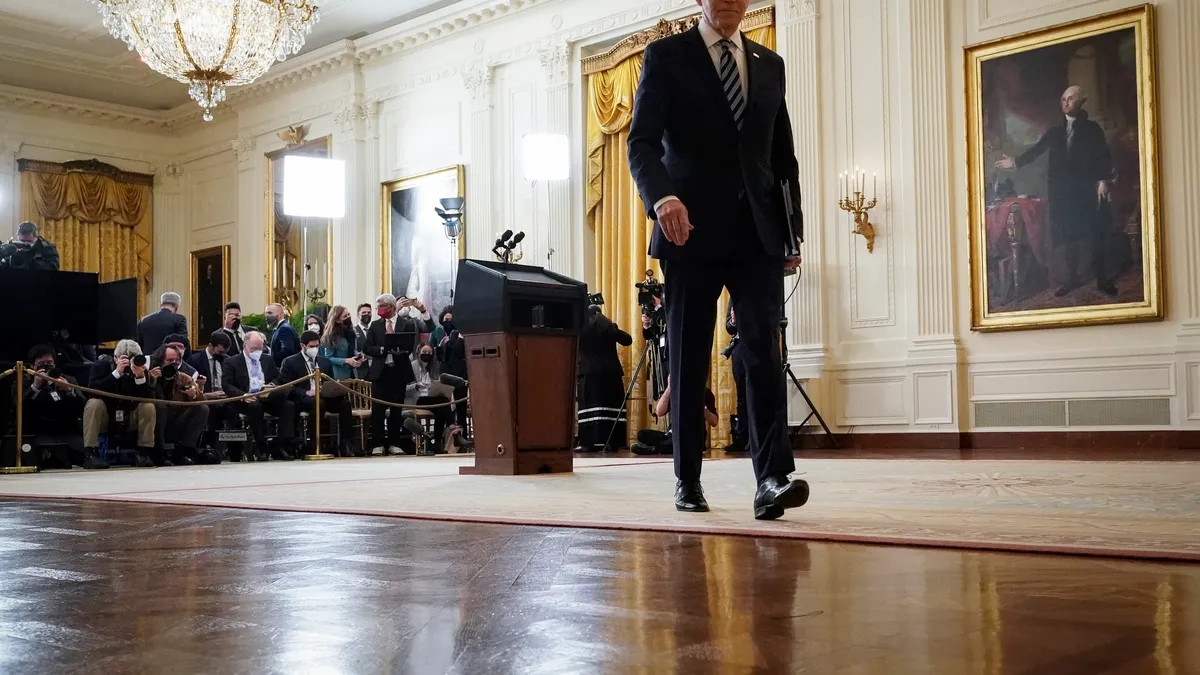Update: Feb. 27, 2022: A coalition of some of the world's richest nations joined together on the weekend to impose their first Swift sanctions against Russia over its invasion of Ukraine, taking a narrowly-tailored approach to cutting off select Russian banks from the international financial messaging system.
The U.S., Canada, Italy, Germany, France and the United Kingdom, plus the European Union, took action Saturday, and were joined by Japan Sunday, the White House said in a statement. The Swift system, which is controlled by an international consortium of banks, allows financial institutions to alert each other to cross-border money transfers, though it isn’t itself the conduit for sending money.
With Japan’s decision to join the group, the Biden Administration noted that the entire group of G-7 nations is on board with the Swift strike against Russia. The seven countries all have economies that rank among the ten biggest in the world, based on their gross domestic product figures. “We will continue working closely together to impose further severe costs and make Putin’s war of choice a strategic failure,” White House Spokesperson Jen Psaki said in the statement.
Disconnecting the Russian banks from the system is aimed at disrupting Russia’s exports and imports, hobbling the country’s economy and generally isolating Russian President Vladimir Putin and his country’s wealthy elite from the world’s banking system. "This will ensure that these banks are disconnected from the international financial system and harm their ability to operate globally," the White House said in its initial statement on Saturday.
In the days since Russia’s invasion of Ukraine on Thursday, some of the countries had disagreed over whether to sever Russian banks' access to Swift. They debated what impact it would have and whether the move could backfire. The limited Swift action at this point leaves room for more severe measures later if the countries decide to impose deeper sanctions on Russia's financial system.
--------------------------------------
The Biden Administration hasn’t ruled out jettisoning Russia from the Swift international payments network as punishment for its invasion of Ukraine even though some U.S. allies and experts argue that the move could cause more harm than good.
President Joe Biden and the European Union on Thursday rebuffed calls by U.K. Prime Minister Boris Johnson and Czech President Milos Zeman to kick Russia out of the Swift network. Several Baltic nations and Canada also urged Russia’s dismissal from Swift.
Biden said the Swift action is “always an option, but right now, that’s not the position the rest of Europe wants to take."
Nonetheless, the Biden Administration attacked Russia's financial system on another front. The Treasury Department’s Office of Foreign Assets Control (OFAC) imposed sanctions Thursday on Russia’s two largest banks in response to the country's invasion of Ukraine earlier in the day. The banks, Sberbank and VTB Bank, together hold more than half of the assets in Russia's banking system.
The Swift option
Belgium-based Swift, which stands for the Society for Worldwide Interbank Financial Telecommunication, is a member-owned company used by its 3,500 financial institution shareholders to communicate regarding cross-border payments across 200 countries. The secure financial communications network is overseen by the G-10 central banks and the European Central Bank, with the National Bank of Belgium as lead overseer, according to its website.
According to Reuters, German Chancellor Olaf Scholz opposed cutting off Russia's access to the payment system. With Russia being a key trading partner for Germany, Scholz indicated he'd prefer to reserve that potential step for a later date, the wire service said.
"It is very important that we agree those measures that have been prepared - and keep everything else for a situation where it may be necessary to go beyond that," Scholz told reporters, according to Reuters.
The Biden Administration sees things differently.
“Just because we didn’t do it today, does not mean it is off the table,” according to a State Department spokesperson who requested not to be named. “Swift is one way to cause temporary disruption. The unprecedented and devastating (sanctions) package will impose immediate and lasting costs on Russia’s financial system and economy and Putin’s ability to project power.
Without access to Swift, Russia would find it difficult to sell its oil and natural gas in international markets. Oil and gas accounts for as much as 60% of the country’s exports and is denominated in U.S. dollars. Exactly how Swift would expel Russia isn’t clear.
Swift describes itself as a "global cooperative" that operates for the benefit of the 11,000 institutions in 200 countries.
"Any decision to impose sanctions on countries or individual entities rests solely with the competent government bodies and applicable legislators," according to a SWIFT statement. A spokesperson declined to elaborate.
“When you talk about cutting (Russia) off from Swift, essentially what you're talking about doing is threatening the consortium itself with some kind of sanctions if it doesn't proactively remove Russian banks and platforms, and it's unclear if that threat is credible,” Joshua Kirchenbaum, a non-resident fellow with the German Marshall Fund, said in an interview. “People want to wave a magic wand and get the result they want but there is no magic wand.”
Russia has also taken steps since 2014 that would cushion any economic blow resulting from a Swift expulsion.
For example, Moscow has built a Swift rival called the System for Transfer of Financial Messages, which isn’t subject to U.S. sanctions and could serve as a substitute for the network. Russia could also fall back on use of the Cross-Border Interbank Payment System, operated by its ally, China. In addition, Russia also has buttressed its foreign currency reserves.
"Even if Russian banks were removed from Swift, companies and financial institutions in the West — especially those in Europe that rely on Russian gas — would need to find ways of working around any Swift restrictions," according to a Jan. 4 story in Foreign Affairs. "Businesses and other purchasers of gas that would normally rely on
Swift messages between their financial institutions and those in Russia would merely revert to pre-1973 modes of communication: telex and telephone calls could process the very same requests for financial transactions, albeit more slowly and less securely."
OFAC action
In the Treasury department move, OFAC banned U.S. financial institutions from opening or maintaining correspondent banking accounts for Sberbank and 25 foreign subsidiaries beginning March 26. Payments that Sberbank attempts to process in U.S. dollars will be disrupted and rejected once the payment hits a U.S. financial institution, the Treasury arm said.
Sanctions against VTB Bank, which is majority-owned by the Russian government, and 20 of its subsidiaries, had swifter effect. VTB-tied assets that are held in U.S. financial institutions will be instantly frozen and inaccessible to the Kremlin, the Treasury Department said.
OFAC imposed similar “blocking” sanctions Thursday against fellow Russian banks Otkritie, Novikom and Sovcom, and expanded the number of Russian entities that fall under stricter rules around new debt and equity to include Sberbank, Gazprombank and Russian Agricultural Bank.
“[Russian President Vladimir] Putin chose this war, and now he and his country will bear the consequences,” President Joe Biden said Thursday. “This is going to impose severe cost on the Russian economy, both immediately and over time.”





















